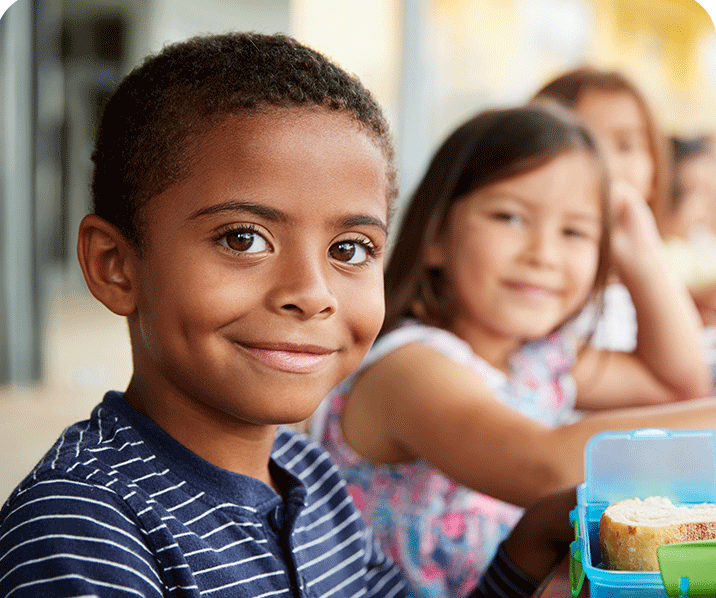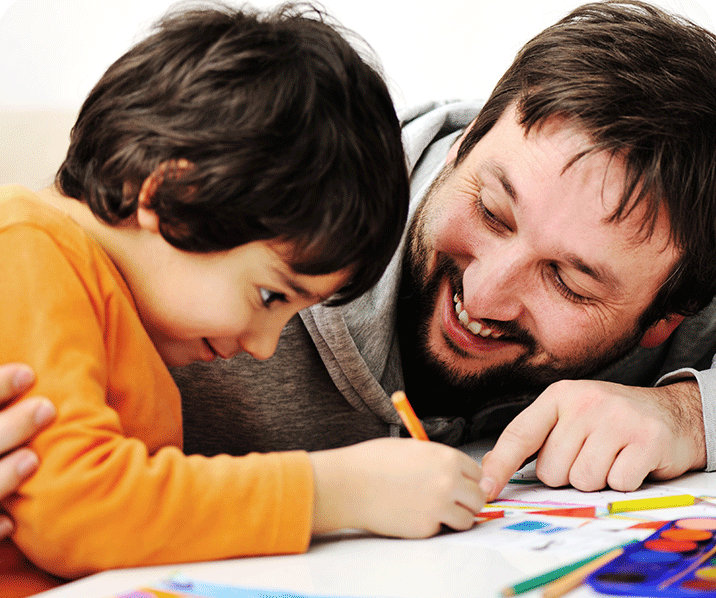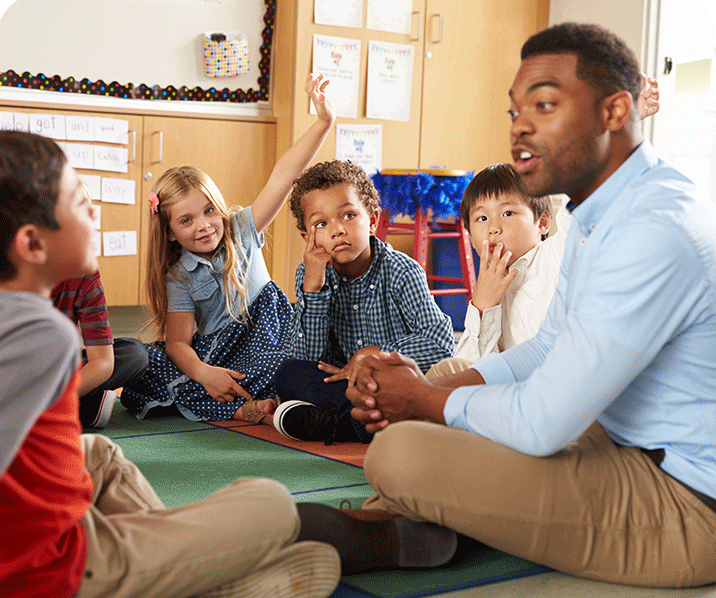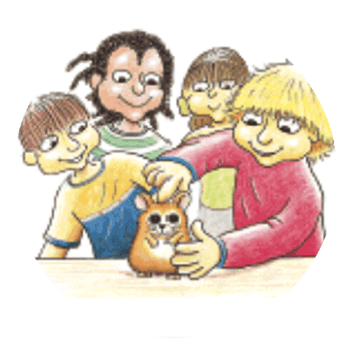Zippy's Friends
Zippy's Friends is a school program that helps teach coping strategies to young children. Over 2 million children have used Zippy's Friends worldwide as a way to promote mental health. Since 2004, this program has been available to Quebecois and Canadian children age 6 - 7 to help them improve their coping and social skills and better adapt to challenges in life.
 Children
Children
"Zippy helps me find a solution when I'm stressed."
 Parents
Parents
"The program helped my son find the words to express his feelings to me."
 Teachers and Professionals
Teachers and Professionals
"The Zippy tools help my students find their own strategies to resolve conflicts during recess.
 School Administrators
School Administrators
“Introducing the program in our school helped teacher and school professionals speak the same language when working to help students.”
About the Program
Zippy's Friends is an innovative school-based mental health promotion program that aims to improve the social and coping skills of children age 6-7. Coping strategies are how people react to stressful and difficult situations in everyday life. The program is based upon the belief that if children can increase their effective coping strategies from an early age, they will be less likely to develop serious problems later in life. This approach was developed by Richard Lazarus and Susan Folkman. They demonstrated that the negative consequences of stressful events can be avoided by using appropriate coping strategies.
Zippy's Friends is promoted by Partnership for Children in England, an international non-profit organization that promotes children's mental health. This mental health promotion tool was designed to help children deal with everyday challenges.
The project started in the late 1990s:
- An international team of consultants analyzed contemporary research on the subject.
- They proposed a program for young children, emphasizing coping strategies.
- Based on the recommendations of the group of experts, authors, illustrators, and specialists in the field of psychology and education created the different components of the program we offer today.
The program has been translated into several languages , and more than 2 million children from 30 countries worldwide have taken part. For more information, visit the website of Partnership for Children, which supports the development of the program and dissimination of the program around the world.
Zippy's Friends, is a school based program delivered by specially trained teachers. To find out how to become a Zippy trainer, click here. The program consists of 6 modules divided into 24 sessions of 45 minutes each and can be delivered weekly or biweekly. Six stories highlight everyday challenges children face, such as emotional awareness, communication, relationship challenges, resolving conflicts, and dealing with loss and change. In addition, children engage in drawing, discussions and role-playing.
The purpose of these activities is to help children explore and understand their feelings and behaviours. The program doesn't tell the students what to do. It doesn't tell them, "this solution is good or bad." Instead, it encourages them to do their own exploration and think for themselves.
Two articles published in the magazine Vivre le primaire testify to the efficacy of the program in Quebec classrooms. Click on these links:
- Dufour, Sarah. (2005). Les amis de Zippy au Québec. Apprendre à faire face aux difficultés dès 6 ans, C’est possible! Vivre le primaire, 18 (4).
- Denoncourt, Julie (2007). Les amis de Zippy au Québec : un programme qui promet! Vivre le primaire, 19 (2).
International Footprint
To date, more than 2 million children worldwide have benefited from the program. Zippy's Friends is currently delivered in more than 30 countries, including Denmark, Lithuania, India, England, Poland, Brazil, Norway, Hong Kong and Iceland. Recognized by the World Health Organization (WHO) as well as by many national governments. In order to know the countries in which the Zippy's Friends program is established, please visit the site of Partnership for Children.
Québec
The Center for Research and Intervention on Suicide, Ethical issues and End-of-Life Practices (CRISE), at the University of Quebec in Montreal (UQAM), is responsible for implementing and evaluating Zippy's Friends in Canada. Since the fall of 2004, several school boards in Canada have adopted the program. Among these regions are the Laurentians, Montérégis area, greater Montreal area, Outaouais area, Niagara, Surrey, Quebec and Windsor.
Do you want to live the Zippy experience?
| 2004-2005 in Quebec |
|---|
|
284 instructors and teachers participated.
|
|
158 schools used the program
|
|
6741 students experienced the Zippy's Friends program.
|
|
|
Feelings |

|
Communication Improve children's ability to communicate their feelings. |

|
Establishing and ending relationships |

|
Resolving Conflicts Increase children's conflict resolution skills. |

|
Change and loss Improve children's skills in coping with change and loss. |

|
Adaptation Increase children's abilities to use a variety of coping strategies in different situations. |
Zippy in Quebec: It's relevance
Directly develops six of the nine cross-curricular competencies of the Quebec School Education Program:
- Solve problems
- Exercise critical judgment
- Cooperate
- Implant creative thinking
- Structure identity
- Communication skills
Targets several of the key factors of youth development and levels of intervention identified by the Healthy Schools approach:
Key Factors:- Social competence
- Self-esteem
- Supportive school, family and community environments
Levels:
- Youth
- School
- Family
Evaluations
Program Evaluations Worldwide
Type of study: Randomized controlled trial, validated scales.
Date of realization: 2016-17
By: Queen's University Belfast, funded by the Education Endowment Foundation
Number of children: 3904
Important benefits:
• Improved self-regulated learning (reported by teacher)
• Very positive evaluation of the process by the teachers
Read the report: https://educationendowmentfoundation.org.uk/projects-and-evaluation/projects/zippys-friends
Date of realization: 2015-16
By: Consortium of Prague Scholars
Number of children: 807
Important benefits:
• self-regulation
• cooperation with peers
• special advantages for children with SEND
Article published: Not yet available
Read the report:
https://www.partnershipforchildren.org.uk/uploads/Files/evaluation/Evaluation_Report_ZippiesFriends_Czech_Republic.pdf
Date of realization: 2012-14
By: The Trimbos Institute
Number of children: 1,177
Important benefits:
Improvement in:
• recognition of emotions
• adaptive coping skills
•motivation
Reduction of:
• hyperactivity
•aggressive behaviour
No significant findings in teacher reports
Article published: Not yet available
Read a summary of the report:
https://www.partnershipforchildren.org.uk/uploads/Files/evaluation/Trimbos%20Evaluation.pdf
Type of study: Randomized controlled trial, validated scales
Date of realization: 2007-08
By: Center for Mental Health for Children and Young People, Eastern and Southern Norway
Number of children: 1,483
Important benefits:
Improvements in:
•Coping skills
• Class climate
•Academic skills
Reduction of:
•Intimidation
• Impact of mental health issues
Articles published:
Solveig Holen, Trine Waaktaar, Arne Lervåg & Mette Ystgaard. The effectiveness of a universal school curriculum on coping and mental health: a randomized, controlled study by Friends of Zippy. Educational Psychology: epub ahead of print. DOI:10.1080/01443410.2012.686152When conducted: 2007-08
Date of realization: 2008-09
By: Center for Health Promotion Research, National University of Ireland at GalwayClarke, A.
Significant benefits
Improvements in:
• Emotional Literacy
•Coping skills
• Classroom relationships
Reduction of:
• Hyperactivity
Program Evaluation in Quebec
Professor Brian Mishara, from the Université du Québec à Montreal, and the director of CRISE, in collaboration with Sarah Dufour, a professor at the University of Montreal, assessed the program's effects on Quebec children. Their study verified whether the expected results from previous research are observed in Quebec students. Furthermore, using a quasi-experimental design, they wanted to observe changes that had only been documented qualitatively in their earlier evaluations (e.g. climate in the class).
Two-thirds of the teachers have perceived changes in the children they associate with the program, Zippy's friends. For example, a teacher noticed that "some children can better talk about what they feel. They are better at admitting feelings like jealousy and anger. They manage to verbalize and express themselves better than before. » P.17. In general, teachers noticed greater student participation in class, a change in children's verbal exchanges and better communication in conflict resolution (Dufour, S., 2005).
Impacts observed in children.
The program was equally effective for boys and girls. Keeping in mind that these children are functioning within the normal range, there was a modest effect on increasing the coping strategies targeted by the program.
Participation in Friends of Zippy was also associated with greater cooperation and autonomy and less internalized behaviours. (Dufour, Denoncourt, and Mishara, 2011)
Click here to see the results from the study conducted in Quebec.
Price of Educational Kits
Prices include a complete kit to use in the classroom as well in-person or video conference training by CRISE professionals.
Zippy Class Package
This turnkey program includes 25 sessions of 45 minutes and a day and half training session. 450$Zippy School Package
Three Zippy kits with training sessions for 3 people. 1350$Sponsor Zippy
Businesses are encouraged to get involved in their community by sponsoring Zippy kits for local schools. Excellent visibility and receipts provided for tax purposes. 2000$
A sequel to Zippy’s Friends
Did you know that Zippy's Friends has a sequel? Apple's Friends portraying the same characters as Zippy's Friends, is available for children aged 8 to 9. If you would like to learn more about this program, contact us!
Ressources
Here are some sample references that report on the results of the evaluations of Zippy's Friends:
- Monkeviciené, O., Mishara, B.L., & Dufour, S. (2006). Effects of the Zippy's Friends programme on children's coping abilities during the transition from kindergarten to elementary school. Early Childhood Education Journal, 34(1), 53-60.
- Mishara, B.L., & Ystgaard, M. (2006). Effectiveness of a mental health promotion program to improve coping skills in young children: Zippy's Friends. Early Childhood Research Quarterly, 21(1), 110-123.
- Bale, C., & Mishara, B.L. (2004). Developing an international mental health promotion programme for young children. International Journal of Mental Health Promotion, 6(2), 12-16.
- Wong, M. (2008). Helping young children to develop adaptive coping strategies. Journal of Basic Education, 17(1), 119-144.
To get a copy of these references email:







